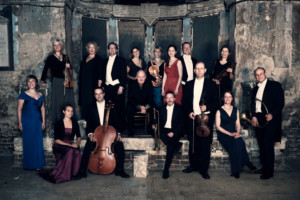Review: KING ARTHUR at Elder Hall, University Of Adelaide
 Reviewed by Barry Lenny, Monday 18th February 2019.
Reviewed by Barry Lenny, Monday 18th February 2019.
To start its year, the State Opera of South Australia is presenting the semi-opera, or dramatick opera, King Arthur, or The British Worthy, a setting of the libretto by John Dryden (1631-1700), who became Britain's first Poet Laureate in 1668, to music by Henry Purcell (1659-1695). The performance is presented by the Gabrieli Consort and Players, conducted by their Artistic Director, Paul McCreesh, the two Adelaide performances following two given in Melbourne as part of the tenth anniversary celebrations of the Melbourne Recital Centre. Late last year State Opera presented Purcell's tragic opera, Dido and Aeneas.
A semi-opera included spoken text and dancing, both elements dispensed with in this performance that focussed on the music and songs. It had more of the feel of a concert version, or even an oratorio, of sorts. All players and singers performed standing, seated at other times, with minimal movement involved, thus keeping the attention on the music.
This is not, though, the familiar Arthurian legend. This work concerns Arthur's battles with the Saxons as he pursues them to protect his throne and his blind love, Emmeline, from their leader. No, not Guinevere. Arthur does not appear in the work. You read that correctly. Nor do the 'knights of the table round'. There is no narrative, just a series of sketches or interludes. Cupid and Venus turn up, and the Germanic gods, Woden, Thor, and Freya are mentioned at the start as the Saxons sing, before the Britons deride them singing Come If You Dare. Paganism is alive and well in this piece.
The Gabrieli Consort and Players are nine singers and seventeen instrumentalists, the singers are divided into six soloists and an ensemble of three, a soprano, and two tenors: Emily Dickens, Christopher Fitzgerald-Lombard, and Thomas Castle. The other six, Anna Dennis, Mhairi Lawson, Hugo Hymas, James Gilchrist, Marcus Farnsworth, and Ashley Riches take on a variety of roles, none of the principal characters in the Arthurian legends. The whole thing is seen through the eyes of peasants, shepherd's, supernatural beings, and more, commenting on the battles, or oblivious to them, their everyday routines showing that they are unaffected by the lofty dealings of kings.
Whether Drydan and Purcell would recognise the work as it exists today, after centuries of editing, which Drydan started himself to please the changing political scene in his time, lost segments, new segments added, and rearrangements, is arguable. Numerous editions have and still do exist, including a brand new one, updating the work to Britain under Brexit. It is rather like A VERY OLD jigsaw, from which a good few pieces had been lost, and pieces of other jigsaws, that seem to match to a degree, have been inserted. We still get the picture, but we know that it is not quite what it once looked like.
This version, by bass violinist, Christopher Suckling, and McCreesh, though, keeps us firmly in the middle of the Baroque, with period instruments, or copies, including two theorbos and a Baroque guitar, a valveless trumpet and, of course, a harpsichord. The string section, including two Baroque bass violins that could pass for 'cellos at a casual glance, use gut strings and are played with the lighter Baroque bows, the orchestra playing in the lower tuning of A.432, not the modern A.440.
McCreesh led the group, with some very lively conducting, joining in with the vocals in the full ensemble sections. His enjoyment of the performance was obvious, and there were plenty of smiles from the singers and musicians, too. This enthusiasm for the work came across, adding to the superb performances, and thunderous applause was heard at the end of the first half and the end of the piece.
This piece was a joy to listen to, with its combination of the wonderful music of Purcell, the rich choral parts, and the numerous solos, duets, and trios. There were so many highlights, both instrumental and vocal, and to single out individual musicians or singers would, perhaps, be somewhat unfair, as they all deserve mention. It was an evening to remember, and a rare chance to hear this work performed live on period instruments. You have only one more chance to hear this performance, tonight, so book those tickets straight away.
Adelaide opera-goers are a traditional lot who love their lavish main-stage operas with their numerous soloists, large choruses, and the Adelaide Symphony Orchestra in the pit. It was not at all surprising to me to find that the upper level of Elder Hall had been closed off, and that there were a good few empty seats in the auditorium. The new management team at State Opera is going to face an uphill challenge in trying to convert their current audience to works like this, or to build a new audience that is not as committed to the major works. There is a risk of losing the current audience and finding no replacement in this bold move.
More small-scale works are ahead, with productions of oft seen pieces, Madama Butterfly, and The Mikado, as the only main-stage events for the year. The major production this year is of Carmen, in Victoria Square in the centre of the city. It will be interesting to see how that one pans out.
Add Your Comment
Videos


